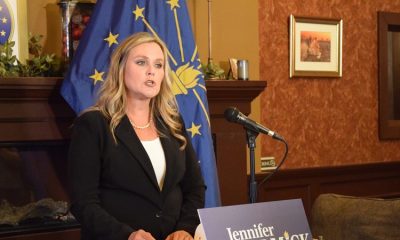U. S. News
Trump extends unemployment benefits, defers payroll tax

BEDMINSTER, N.J. — Bypassing Congress, President Donald Trump on Saturday signed executive orders deferring payroll taxes for some Americans and extending unemployment benefits after negotiations on a new coronavirus rescue package collapsed.
Trump accused Democrats of loading up their rescue bill with priorities unrelated to the coronavirus. “We’ve had it,” he said at a news conference at his country club in Bedminister, New Jersey.
Trump said the payroll tax cut would apply to those earning less than $100,000 a year. He said that if he is reelected in November, he would look at the possibility of making the payroll tax permanent.
Extra aid for the unemployed will total $400 a week, a cut from the $600 that just expired.
Trump also signed executive orders holding off student loan payments and extending the freeze on evictions.
BEDMINSTER, N.J. — Ready and willing to bypass elected lawmakers, President Donald Trump seemed set to claim the power to suspend payroll taxes and extend expired unemployment benefits after negotiations with Congress on a new coronavirus rescue package collapsed.
The White House signaled Saturday that the president was soon expected to sign four executive orders, contending Washington’s gridlock had compelled him to act as the pandemic undermined the country’s economy and the November election nears. Trump scheduled an afternoon news conference at his country club in Bedminster, New Jersey.
Perhaps most crucially, he intended to extend the unemployment benefits that have run out, but it was not clear whether the assistance would remain at $600 a week or where the money would come from. He also planned to defer the payroll tax until the end of the year, hold off student loan payments and enforce a freeze on evictions.
Trump has largely stayed on the sidelines during the administration’s negotiations with congressional leaders. The talks, which broke down in recent days, were led on his side by chief of staff Mark Meadows and Treasury Secretary Steve Mnuchin.
The president said at his club on Friday night that “if Democrats continue to hold this critical relief hostage I will act under my authority as president to get Americans the relief they need.”
Democrats had said they would lower their spending demands from $3.4 trillion to $2 trillion but said the White House needed to increase their offer. Republicans have proposed a $1 trillion plan.
White House aides have watched the talks break down with apprehension, fearful that failure to close a deal could further damage an economic recovery already showing signs of slowing down. Friday’s jobs report, though it beat expectations, was smaller than the past two months, in part because a resurgence of the virus has led to states rolling back their reopenings.
The president’s team believes the economy needs to stabilize and show signs of growth for him to have any chance at winning reelection. Aides were hoping to frame the expected executive orders signings as a sign that Trump was taking action in a time of crisis. But it also would reinforce the view that the president, who took office declaring he was a dealmaker, was unable to steer the process to an agreement.
Also, the anticipated orders would be smaller in scope than congressional legislation.
“This is not a perfect answer — we’ll be the first ones to say that,” Meadows said Friday as talks broke down. “But it is all that we can do and all the president can do within the confines of his executive power, and we’re going to encourage him to do it.”
Trump has not specified how the payroll tax deferral would work, and it was unclear whether he had the authority to take such an action without approval from Congress.
The move would not aid unemployed workers, who do not pay the tax when they are jobless, and would face bipartisan opposition in Congress. The cut, long a Trump wish, would affect payroll taxes that are intended to cover Medicare and Social Security benefits and take 7 percent of an employee’s income. Employers also pay 7.65% of their payrolls into the funds.
Both the House and Senate have left Washington, with members sent home on instructions to be ready to return for a vote on an agreement. With no deal in sight, their absence raised the possibility of a prolonged stalemate that stretches well into August and even September.
Often an impasse in Washington is of little consequence for the public — but not so this time. It would mean more hardship for millions of people who are losing enhanced jobless benefits and further damage for an economy pummeled by the still-raging coronavirus.
Friday’s negotiations at the Capitol added up to only “a disappointing meeting,” said Senate Democratic leader Chuck Schumer of New York. He said the White House had rejected an offer by House Speaker Nancy Pelosi, D-Calif., to curb Democratic demands by about $1 trillion. Schumer urged the White House to “negotiate with Democrats and meet us in the middle. Don’t say it’s your way or no way.”
That Capitol Hill session followed a combative meeting Thursday evening that for the first time cast real doubt on the ability of the Trump administration and Democrats to come together on a fifth COVID-19 response bill.
Pelosi declared the talks all but dead until Meadows and Mnuchin give ground.
The breakdown in the negotiations is particularly distressing for schools, which have been counting on billions of dollars from Washington to help with the costs of reopening. But other priorities are also languishing, including a fresh round of $1,200 direct payments to most people, a cash infusion for the struggling Postal Service and money to help states hold elections in November.
Mnuchin said renewal of a $600 per-week pandemic jobless boost and huge demands by Democrats for aid to state and local governments are the key areas where they are stuck.
Democrats have offered to reduce her almost $1 trillion demand for state and local governments considerably, but some of Pelosi’s proposed cost savings would accrue chiefly because she would shorten the timeframe for benefits like food stamps.
Pelosi and Schumer continue to insist on a huge aid package to address a surge in cases and deaths, double-digit joblessness and the threat of poverty for millions of the newly unemployed.
Senate Republicans have been split, with roughly half of Majority Leader Mitch McConnell’s rank and file opposed to another rescue bill at all. Four prior coronavirus response bills totaling almost $3 trillion have won approval on bipartisan votes despite intense wrangling, but conservatives have recoiled at the prospect of another Pelosi-brokered agreement with a whopping deficit-financed cost.
McConnell has kept his distance from the negotiations while coordinating with Mnuchin and Meadows.
-

 Indiana2 weeks ago
Indiana2 weeks agoWhile staff members get ready to move into a new structure, the Westfield Washington Public Library shutters
-

 Local News2 weeks ago
Local News2 weeks agoVehicle crashes into the Monroe County food bank
-

 Local News2 weeks ago
Local News2 weeks agoNew Fort Wayne mayor, its 1st Black leader, in caucus to replace late mayor
-

 Local News2 weeks ago
Local News2 weeks agoThe biggest teachers union in Indiana supports Jennifer McCormick for governor
-

 Local News2 weeks ago
Local News2 weeks agoIndiana Chamber of Commerce program recognizes Indiana Members Credit Union
-

 Local News2 weeks ago
Local News2 weeks agoAn interim superintendent was selected during the MCCSC board meeting, and Childs-Templeton Elementary Schools will merge
-

 Indiana1 week ago
Indiana1 week agoAmazon Web Services is investing $11 billion to build a new data center in Indiana
-

 Local News1 week ago
Local News1 week agoDemocrat Jennifer McCormick gets teacher union endorsement in race for Indiana governor





Leave a Reply